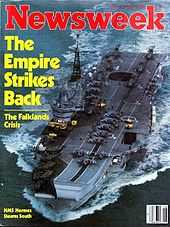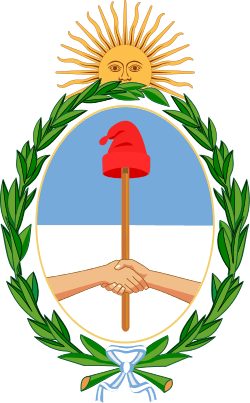Argentina–United Kingdom relations
 |
|
United Kingdom |
Argentina |
|---|---|
Argentine–United Kingdom relations refers to foreign relations between Argentina and the United Kingdom.
Both countries established diplomatic relations on December 15, 1823. Diplomatic relations were cut off before the Falklands War (1982) and they were reinstated in 1990. Post-war relations between the two countries improved significantly up until the mid-2000s. Recent relations have become increasingly strained, with both countries reasserting their claims to the Falkland Islands.
Argentina has an embassy in London and the United Kingdom has an embassy in Buenos Aires. The current British Ambassador to Argentina is John Freeman. The current Argentine Ambassador to the United Kingdom is Alicia Castro.
Both states are members of the G-20.
History
The modern territory of Argentina was initially part of the Spanish Empire. The Falkland Islands sovereignty dispute was initially a dispute of Spain and Britain, with events such as the Falklands Crisis of 1770. Spain allied with France against Britain during the Napoleonic Wars, so Britain launched the British invasions of the Río de la Plata. The first British attack invaded Buenos Aires, the city was liberated by Santiago de Liniers with forces from Montevideo. A second attack invaded Montevideo, but failed to invade Buenos Aires a second time, and Montevideo was returned to Spain during the surrender. France attacked Spain (starting the Peninsular War in Europe) and Spain allied with Britain, so the British made no further attacks at the Río de la Plata.
The Peninsular War, the social changes caused by the huge militarization of the people of Buenos Aires and other local and international influences led to the May Revolution, which began the Argentine War of Independence. Britain stayed neutral during the conflict, and accepted the Argentine Declaration of Independence on December 15, 1823. The formal relations were established with the Treaty of Friendship, Commerce and Navigation Between Argentina and the United Kingdom.
Falklands War

On April 2, 1982, Argentina under President Leopoldo Galtieri launched an invasion of the Falkland Islands and on April 3, 1982 this was followed by the Argentine invasion of the South Georgia Island.[1] This resulted in the British deploying forces to the Falkland Islands hence causing the Falklands War.
Today, despite the British victory in the Falklands War, Argentina still claims the Falkland Islands.
Post-war relations
Diplomatic relations between the two countries were reinstated in 1990 after the departure of Margaret Thatcher from the post of Prime Minister of the United Kingdom. Argentina now has an embassy in London and the United Kingdom has an embassy in Buenos Aires. Relations improved further in the 1990s between the UK and Argentina. In 1998, Carlos Menem, the President of Argentina visited London, where he reaffirmed his country's claims to the Islands, although he stated that Argentina would use only peaceful means for their recovery. In 2001, Tony Blair, Prime Minister of the United Kingdom visited Argentina where he stated that he hoped the UK and Argentina could resolve their differences that led to the 1982 war. However, no talks on sovereignty took place during the visit and Argentina's President Néstor Kirchner stated that he regarded gaining sovereignty over the islands as a 'top priority' of his government.[2]
Straining in relations
Since the mid-2000s however, diplomatic relations between the UK and Argentina have become increasingly strained. In 2006, Argentina renewed claims to the Falkland Islands, citing concern over fishing and petroleum rights.[3] On 28 March 2009, UK Prime Minister Gordon Brown stated that there was “nothing to discuss” with Cristina Kirchner, the Argentine president, over sovereignty of the islands, when they met in Chile on his pre-2009 G-20 London Summit world tour.[4] On 22 April 2009 Argentina made a formal claim to the UN to an area of the continental shelf encompassing the Falklands, South Georgia and South Sandwich Islands, and parts of Antarctica, citing 11 years worth of maritime survey data.[5] The UK quickly protested these claims.[6]
Since 2010, reports of British oil exploration around the Falkland Islands have caused a further downturn in UK-Argentine relations.[7] In February 2010 the Argentine government announced that ships travelling to the Falklands (as well as South Georgia and the South Sandwich Islands) would require a permit to use Argentine territorial waters. Despite the new restrictions, Desire Petroleum began drilling for oil on 22 February 2010, about 54 nautical miles (100 km, 62 mi) north of the Islands.[8]

South America countries have generally shown support for Argentina over the Falkland Islands sovereignty dispute in recent years. This is in contrast to the Falklands War when Britain was supported by Chile. In 2011 the Mercosur bloc agreed to close ports to ships flying the Falkland Islands flags, while British-flagged ships would continue to be allowed.[9] The Unasur group of nations has asked the United Kingdom to pursue negotiations over the islands' sovereignty.[10] On 19 March 2012, Peru announced that it was cancelling a visit by the Royal Navy frigate HMS "Montrose" in support of Argentina's legitimate right to the islands.[10]
At the G20 Summit in Mexico in June 2012, British Prime Minister David Cameron and Argentine President Cristina Fernández de Kirchner met unexpectedly in a corridor on the fringes of the G20 Summit and exchanged, at least in diplomatic terms, some rather heated words. Prime Minister Cameron told President Kirchner that she should "respect the views" of Falkland residents, who had announced the 2013 referendum, on the issue of future sovereignty of the island. President Kirchner then attempted to hand an envelope to the Prime Minister but he refused to accept it.[11]
In March 2013 the Falkland Islanders voted overwhelmingly in a referendum for the territory to remain British. 1513 to 3, 99.8% in favor of British control. Argentina dismissed the Falkland Islands' sovereignty referendum.[12][13] The UK Government urged Argentina and other countries to respect the islanders' wishes.[14]

Cultural relations
According to the 2001 UK Census, some 3,932 Argentine born people were living in the UK.[15] Between 1997 and 2008, 1,062 Argentines acquired British citizenship.
There is a strong British cultural influence in Argentina and a large Argentine-British community around Buenos Aires. There is also a strong Welsh-speaking Argentine-Welsh community in Chubut, Patagonia. Of the 25,000 Welsh speakers in Argentina,[16] 5,000 live in the Chubut region,[17] particularly in the original Welsh settlements of Trelew and Trevelin. A large number of Argentine football players play for British clubs. The British Council promotes an active academic, cultural and educational programme in Argentina. The British Council administers the Chevening Scholarship programme, funded by the Foreign and Commonwealth Office, which sends approximately 15 Argentine postgraduate students to the UK each year.
See also
- Foreign relations of Argentina
- Foreign relations of the United Kingdom
- Latin American migration to the United Kingdom
- List of Ambassadors of the United Kingdom to Argentina
References
- ↑ "Argentina invades Falklands". History.com.
- ↑ "Blair y Kirchner adelantaron diálogo". BBC World Service (in Spanish). 14 July 2003. Retrieved 14 June 2010.
- ↑ McDermott, Jeremy (30 June 2006). "Argentina renews campaign over Falklands claim". The Telegraph.
- ↑ Bourne, Brendan (28 March 2009). "Gordon Brown rejects Argentina’s claim to the Falklands". The Times (London).
- ↑ Piette, Candace (22 April 2009). "Argentina claims vast ocean area". BBC News.
- ↑ "'Not so fast,' says Britain as Argentina makes fresh appeal to UN over Falkland Islands". The Mail on Sunday (London). 23 April 2009.
- ↑ "Oil drilling begins in the Falkland Islands". Channel 4 News. 21 February 2010.
- ↑ "Drilling for oil begins off the Falkland Islands". BBC News. 22 February 2010. Retrieved 22 February 2010.
- ↑ "Argentina and the Falklands: Rocking the boat". The Economist. 31 December 2011. Retrieved 16 January 2013.
- ↑ 10.0 10.1 (Spanish) Perú cancela la visita de una fragata británica en solidaridad con Argentina, BBC Mundo, 19 March 2012.
- ↑ "David Cameron and Argentina's Cristina Kirchner in corridor clash over Falklands ''The Telegraph (UK)". Telegraph.co.uk. Retrieved 2012-07-02.
- ↑ Borger, J. (1 February 2013). "UK 'disappointed' as Argentina turns down talks over Falklands.". The Guardian. Retrieved 26 January 2014.
- ↑ "Falkland Islands: respect overwhelming 'yes' vote, Cameron tells Argentina". The Guardian (The Guardian). 12 March 2013. Retrieved 12 March 2013.
- ↑ "Falklands referendum: Voters choose to remain UK territory". BBC UK. 12 March 2013.
- ↑ "Country-of-birth database". Organisation for Economic Co-operation and Development. Retrieved 29 July 2010.
- ↑ "Languages of Argentina"- Ethnologue.com
- ↑ "Wales and the World" - Wales.com
External links
- List of Treaties ruling the relations Argentina and United Kingdom (Argentine Foreign Ministry, in Spanish)
- Argentine Embassy in London
- British embassy in Buenos Aires
| |||||||||||||||||||||||||||||||||||||||||
| |||||||||||||||||||||||||||||||||||||||||||

